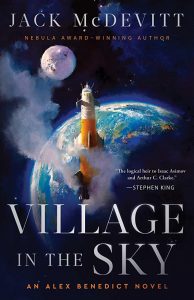Russell Letson Reviews Village in the Sky by Jack McDevitt
 Village in the Sky, Jack McDevitt (Saga 978-1-6680-0429-6, $29.99, 341 pp, hc) January 2023. Cover by John Harris.
Village in the Sky, Jack McDevitt (Saga 978-1-6680-0429-6, $29.99, 341 pp, hc) January 2023. Cover by John Harris.
The possibility that humankind might be alone in a universe empty of intelligent life runs right through Jack McDevitt’s work, from The Hercules Text (1989) to several of the stories in last year’s Return to Glory collection. It is a particularly prominent motif in the Alex Benedict novels, which trace the adventures of antiquities dealer (and explorer and problem- and mystery-solver) Alex Benedict and his pilot/assistant Chase Kolpath. In nine thousand years of interstellar travel and exploration, we have found only one living intelligent alien species, the telepathic Ashiyyur, with whom the human Confederacy had a brief war. There is plenty of non-sentient life out there, but aside from the Ashiyyur, we have no one to talk to. (And the Ashiyyur don’t really talk.)
Things take a dramatically different turn in the ninth book of the series, Village in the Sky, when the search for intelligent life hits the jackpot. The story’s main thread is indicated by the title: the discovery, on a very distant world, of a single village with humanoid inhabitants and at least a modest level of technology. Cultural-political tensions put severe limits on first-contact situations, however. The Visitation Project expedition that finds the village is supposedly scouting for habitable worlds but “they were really looking for someone to talk to.” On the other hand, the Confederacy government maintains cautious protocols that forbid immediate contact or revelation of human observers. But a follow-up mission finds no trace of a village or any habitation, only a planet with life but empty of any sign of civilization.
While those events are playing out, alien visitors come a-knockin’ at Benedict’s homeworld of Rimway. The Ulakans have taken this moment to reveal themselves, and they appear to be friendly, sociable beings who, despite their disturbingly nonhuman appearance, are quite like us in their interests in, say, literature and theatre. In fact, their introductory gifts to us are books – one of which, translated as Living the Good Life, sounds like an Ulakan version of a self-help book – and they are eager to receive our books in return.
Then the Ulakans go home, and the story returns to the riddle of the vanished village. In the face of official discouragement, Alex Benedict manages to assemble a second return expedition, which becomes a rambling progress across the increasingly remote parts of the galaxy. This is where an item from last year’s collection Return to Glory – “What’s the Point of Being Alive if You’re a Tree?” – is woven into its proper place in this loose-jointed narrative. What had been a problem-solving exercise with a side order of creepy First Contact raises even more questions and challenges that open up even more unexpected discoveries.
What might (to some readers) be stranger than those discoveries are the quotidian details of life 9000 years hence. Rimway, like the rest of the human Confederacy, is the opposite of a strange and exciting World of the Future. There are amateur theatrics, late-night comedians, op-ed writers, political scandals, posh restaurants, and oceanside boardwalks with roller coasters. Despite the omnipresence and apparent personhood of artificial intelligences, of technologies that extend lifespans to 200 years and enable an interstellar civilization, Rimway feels rather suburban American.
So perhaps it is no surprise that while the discovery and disappearance of the village and the visit by the Ulakans get big reactions from scientists, academics, and the news media and its commentariat, the public at large seems to treat them as nine-day wonders. Much of the first part of the novel depicts mixed reactions to the possibility of finding alien intelligences and civilizations. Some of it is rooted in fear, but most of it seems to be a simple inward-turning. Thematically, this sorts well with many of the stories in Return to Glory, which turn on the contrast between the marvels of the universe and the ordinariness of most human life – and the fact that for many, ordinariness is the preferred condition. One part of the story line follows Alex’s difficulties in assembling a small team for his expedition – even Chase is initially reluctant to take on a long, tedious voyage when her “personal life had become especially enjoyable.” And the official responses are so stubbornly cautious as to seem indifferent to what the presence of multiple nonhuman civilizations might mean for our place in the greater universe.
The book’s opening line is a firearm over the mantelpiece: “I never thought the day would come when I’d settle in to write an Alex Benedict memoir in which Alex and I are the bad guys.” The story’s resolution pulls the trigger of that gun, and I’m not sure whether to call the results a bang or a whimper for the Confederacy, but it certainly has implications for the kinds of adventures Alex and Chase might have in future volumes.
Russell Letson, Contributing Editor, is a not-quite-retired freelance writer living in St. Cloud MN. He has been loitering around the SF world since childhood and been writing about it since his long-ago grad school days. In between, he published a good bit of business-technology and music journalism. He is still working on a book about Hawaiian slack key guitar.
This review and more like it in the April 2023 issue of Locus.
 While you are here, please take a moment to support Locus with a one-time or recurring donation. We rely on reader donations to keep the magazine and site going, and would like to keep the site paywall free, but WE NEED YOUR FINANCIAL SUPPORT to continue quality coverage of the science fiction and fantasy field.
While you are here, please take a moment to support Locus with a one-time or recurring donation. We rely on reader donations to keep the magazine and site going, and would like to keep the site paywall free, but WE NEED YOUR FINANCIAL SUPPORT to continue quality coverage of the science fiction and fantasy field.
©Locus Magazine. Copyrighted material may not be republished without permission of LSFF.







